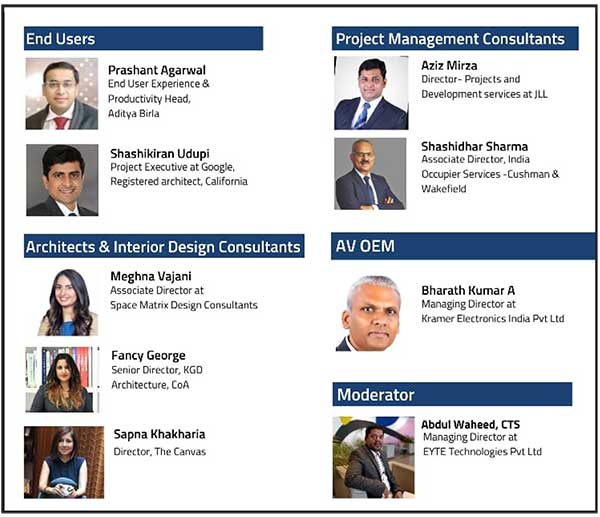Eyte Technologies Organise Webinar On “40-Days Lockdown-Acceleration Towards Digital Transformation” in Association With Kramer
The coronavirus pandemic outbreak crisis, which has affected millions of people across the world, has mandated the adoption of technology and tools like video conferencing, online collaborative tools, data on cloud etc.
Eyte Technologies Pvt Limited in association with Kramer recently organised a Webinar on the topic - 40-days lockdown-acceleration towards Digital Transformation. The panel boasted of well-known speakers with more than two decades of experience in their respective fields from across the project industry spectrum comprising of end users, architects, PMC and AV equipment manufacturers.
Moderated by Abdul Waheed – Managing Director of Eyte Technologies Pvt. Ltd., the panel comprised of Fancy George – Senior Director, KGD Architecture; Aziz Mirza – Director, Project and Development services at JLL; Meghana Vajani – Associate Director at Spacematrix Design Consultant Private Limited; Sapna Khakharia - Director, THE CANVAS, one of India’s leading architectural and design studio; Udupi Shashikiran - Project Executive at Google; Prashant Agarwal - General Manager at Aditya Birla Group and Bharat Kumar from Kamer.
Cisco Webex was the Technological Platform Partner for this event.

The discussion focused on the impact of Covid 19 on ongoing projects and a 180-degree shift in office designs considering work from home as an emerging work style for many offices fulfilling social distance demands. In the session, Technology emerged as the tool for survival going forward and the panel discussed the possible shift of touch free technology solutions, automation, AV, IT and AI solutions from being luxury solutions to being must haves for new office designs.
Meghna Vajani, expressed that there is going to be huge manpower crunch once the offices resume back and that there was a need to be optimistic about the situation, as it would not be the end of life. Besides contributing to family and social bondings, Aziz Mirza noted the other pros of WFH and discussed how it is set to become the norm. Replying to one of the questions put forth, Facny George, said that office space designs would in future be very different, giving an indication of more technology discussion for projects now. She said, “the involvement of technology is going to increase in offices, right from thermal screening, to clean air in the office, you guys need to help us.” Prashant Agarawal from Aditya Birla Group added that ‘even the traditional offices would now think about a mandate on WFH for certain percentage of office staff. Shashikiran Udupi said that Google had been at the forefront of technology since years, and data analytics, use of collaboration tool, web meetings etc. would in future be the mandate in many offices. Bharat Kumar reinforced that Kramer had many solutions in the AV and IT domain which could easily address the challenges being faced by the designers in post covid office designs.
The panelist also felt that, not all is lost. The word “crisis” in Chinese is composed of two characters, one representing danger and the other, opportunity and that it was time to focus on the second part, ‘opportunity’.
Panelists noted that technology had lessened the impact of social distancing enabling people to use technology in innovative and new ways and all the panelists agreed that companies would now invest more in tools enabling employees to work remotely and collaborate virtually, assess their current bandwidth to support remote work, perform periodic network stress testing and identify workarounds for critical tasks that are not executable from home.
The discussions also envisioned many new possibilities to emerge, which would put India as a strong power to reckon with on the world map.
The Webinar received positive feedback from Audiences who attended. All were unanimous in that the session was insightful, positive and provided good insight of how things would change and how soon one could adapt to the changes.